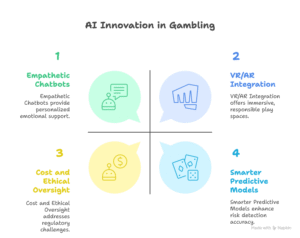A few years ago, I watched a close friend get swept up in the thrill of online gambling. What started as a casual pastime quickly turned into late-night sessions and mounting losses he couldn’t afford. I remember the helplessness I felt, wishing there was something—or someone—to step in before it got worse. Today, that “someone” might just be artificial intelligence.
In an industry often criticized for its risks, AI is emerging as a quiet guardian, promoting AI responsible gambling practices in ways that feel both innovative and human. From nudging players to take breaks to spotting trouble before it spirals, AI responsible gambling tools are transforming how we play—and how we stay safe.
The gambling world has always walked a tightrope between entertainment and excess. According to the Responsible Gambling Council, roughly 1% of North American adults face severe gambling problems, with another 2-3% teetering on the edge. That’s millions of people who need more than luck to keep things in check.
Enter AI: a technology that’s flipping the script by analyzing data, predicting risks, and offering support at scale. In this post, we’ll unpack how AI is reshaping responsible gambling, dive into real-world examples, and wrestle with the ethical tightrope it walks—all while keeping it clear, engaging, and grounded in fresh insights.
What Does Responsible Gambling Really Mean?
Responsible gambling isn’t just a buzzword—it’s a framework to keep the fun alive without letting it tip into harm. At its core, it’s about:
- Staying in control: Gambling within your financial and emotional limits.
- Protecting the vulnerable: Shielding minors and at-risk players from exploitation.
- Offering a lifeline: Providing tools and resources for those who need help.
Why does it matter? Because gambling’s allure can be a double-edged sword. For every thrilling win, there’s a shadow risk of addiction or financial strain. Regulators worldwide demand operators prioritize player safety, and AI is stepping up as a powerful ally to make that happen.
How AI is Powering Responsible Gambling
AI’s strength lies in its ability to crunch massive datasets and act fast—qualities that make it perfect for tackling gambling’s challenges. Here’s how it’s making a difference:
1. Personalized Player Profiling: Knowing You Better Than You Know Yourself
Ever notice how your phone seems to predict your next move? AI does that for gambling too. By tracking betting frequency, wager sizes, and session lengths, it builds detailed player profiles. These aren’t just stats—they’re windows into behavior. A sudden spike in bets or late-night marathons? AI flags it as a potential red alert.
- Real-world impact: Take Mindway AI’s GameScanner. It blends neuroscience and AI to spot at-risk players with eerie accuracy, helping operators tailor interventions like deposit caps or time-out suggestions.
- Why it’s unique: Unlike blanket rules, this is personal. It’s like having a coach who knows your weak spots and steps in before you stumble.
2. Real-time Monitoring: The Nudge You Didn’t Know You Needed
Picture this: You’re deep into a poker game, chasing a loss, when a pop-up says, “Hey, you’ve hit your limit—time for a breather?” That’s AI watching your back. It monitors activity live, catching patterns like loss-chasing or overspending as they unfold.
- How it works: If you blow past a pre-set deposit threshold, AI can ping you with a friendly alert or notify the operator to check in.
- Fresh take: It’s not nagging—it’s a digital tap on the shoulder, blending tech smarts with human care.
3. Predictive Analytics: Stopping Trouble Before It Starts
AI doesn’t just react—it predicts. By sifting through historical data, it spots patterns linked to problem gambling, like erratic bets or frequent deposits. Operators can then step in early, offering resources or dialing back aggressive marketing.
- Evidence in action: A Swedish study showed AI-driven personalized messages cut gambling activity in 65% of recipients. That’s proactive protection, not a band-aid fix.
- Insight: This flips the game—casinos aren’t just profiting; they’re preventing harm with data-driven foresight.
4. 24/7 Support: AI Chatbots That Actually Listen
Need help at 3 a.m.? AI’s got you. Chatbots powered by natural language processing can field questions about setting limits or finding support, any time of day. They’re not perfect, but they’re a lifeline when human reps are off the clock.
- Why it stands out: Instant access beats waiting on hold. It’s like a night-shift counselor who never sleeps.
- Example: Some platforms use bots to guide players to Gamblers Anonymous or local helplines—small steps with big impact.
5. Fraud Detection: Safety as a Foundation
Okay, this one’s a bit indirect, but hear me out. AI’s knack for spotting fraud—think odd transaction patterns or account hacks—creates a secure environment. A safer platform means players can focus on fun, not fear.
- Quick stat: Fraud costs the gambling industry billions yearly, per Forbes. AI’s cutting that down, building trust one secure bet at a time.
- Twist: Security isn’t just techy—it’s a cornerstone of responsible play.
The Ethical Tightrope: Can AI Be Trusted?
Here’s where it gets tricky. AI’s a tool, not a saint. The same algorithms that nudge you to pause could, in the wrong hands, push you to play more. Imagine personalized ads hitting your inbox just when you’re most vulnerable—creepy, right?
A Nature Machine Intelligence meta-analysis nails it: AI needs transparency, fairness, and accountability. In gambling, that means:
- Guarding against exploitation: No using data to prey on weaknesses.
- Being upfront: Letting players know how AI tracks them.
- Setting boundaries: Following strict ethical codes, like those from the European Gaming and Betting Association.
Personal spin: My friend’s spiral might’ve been caught by AI—but only if it was programmed to help, not hustle. That’s the line we can’t cross.
What’s Next for AI in Gambling?
AI’s just getting started. Picture virtual reality casinos where AI adjusts the vibe based on your mood, or chatbots that sense frustration and offer real-time tips. Predictive models could get sharper, catching risks with pinpoint precision. But every leap forward needs a leash—regulation and ethics must keep pace.
| Innovation | Potential Impact | Challenge |
|---|---|---|
| VR/AR Integration | Immersive, responsible play spaces | Cost and ethical Oversight |
| Smarter Predictive Models | Earlier, more accurate interventions | Data privacy concerns |
| Empathetic Chatbots | Personalized emotional support | Avoiding overreach |
Wrapping Up: A Safer Bet with AI
AI responsible gambling isn’t a sci-fi dream—it’s here, quietly reshaping an industry that’s long needed a reset. From profiling players to predicting pitfalls, it’s turning data into a safety net. My friend? He’s okay now, but I can’t help thinking AI could’ve softened his fall. The catch is keeping it ethical—using it to protect, not push.
As AI evolves, its promise is clear: a gambling world where fun doesn’t mean falling apart. What do you think—can AI really balance profit and care? Drop your take below or explore our tech-in-gaming series for more.
Loved this dive into AI’s role? Share it with a friend who’d geek out too—or sign up for our newsletter to stay ahead of the tech curve!


















